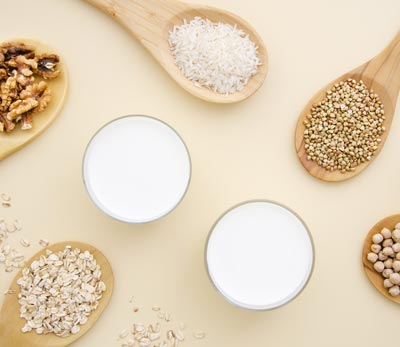
Tryptophan. Why is it important for our state of mind?
A good state of mind is essential for good health. Thanks to it, we can face and manage situations that may generate stress or adversity in our daily lives.
Serotonin, the so-called "happiness hormone", is the neurotransmitter in charge of regulating moods and generating a feeling of well-being and relaxation as well as a satisfactory level of self-esteem. Its production depends directly on a fundamental amino acid in nutrition: tryptophan, which can be found in foods and food supplements.
What is tryptophan and what is it for
Tryptophan (L-5-HTP) is an essential amino acid in human nutrition and is one of the 20 amino acids included in the genetic code. It plays an important role in many of our metabolic functions, but also in the creation of new cells.
In our body, with the essential amino acid L-tryptophan (LT), serotonin (a neurotransmitter whose action regulates moods and appetite), melatonin (a hormone that regulates the sleep cycle), and vitamin B3 (niacin) are formed.
In addition, it also serves other important purposes such as nitrogen balance in adults and growth in children.
Properties of tryptophan
As we have already mentioned, tryptophan is involved in the production of serotonin in the brain, which is responsible for regulating sleep patterns and moods, but also appetite and temperature, among many other processes. Therefore, maintaining good levels of this amino acid is essential for our well-being.
Tryptophan activity also influences the levels of other neurotransmitters such as dopamine and noradrenaline, which are also involved in mood-related processes.

What properties does tryptophan have in our body?
The properties provided by tryptophan are directly related to the maintenance of normal levels of serotonin and melatonin in our body, since it is responsible for their production. Therefore, tryptophan as a precursor of serotonin and melatonin can help:
- Promoting a better quality of the sleep cycle and rest.
- Regulating emotional well-being.
- Contributing to a good state of mind
- It also controls pain tolerance.
Mood disorders
Prolonged feelings of sadness or exuberance are examples of how mood disorders, all regulated by serotonin produced from tryptophan, manifest themselves.
These disorders regulate our emotions and behavior, the most common of which include depression, schizophrenia, or manic, panic or bipolar disorder.
In addition, there are several factors that affect your potential development such as age, stress, physical inactivity, genetics, drug use and other environmental factors. Diet also plays an important role in your state of mind, improving or aggravating your symptoms or controlling their progression.
Serotonin also influences the processes in the brain that are involved in learning. Thus in general, the conversion of tryptophan into serotonin is responsible for changes in state of mind and cognitive processes.
Tryptophan and anxiety
From the above, it can therefore be said that low tryptophan levels influence serotonin concentrations and are associated with mood disorders such as depression.
The alteration of its blood levels, when they are lower than normal, also has to do, therefore, with a feeling of tenseness or nervousness, which can contribute to the appearance of anxiety.
Melatonin and tryptophan in sleep quality
Once serotonin has been produced from tryptophan in the body, it can be converted into another important molecule: melatonin.
Melatonin is the hormone that regulates sleep cycles, including the metabolism of nutrients in our body and the immune system. Thus, because of its role in the formation and production of melatonin, tryptophan is also related to adequate rest and its quality.
Among other nutrients, tryptophan promotes sleep quality as well as supporting your state of mind, although the two issues are related. A good rest prepares us to face the day in the best possible way.
How to take tryptophan
Tryptophan is present in protein-rich foods and you can supplement this with food supplements that contain it. These often combine tryptophan with other minerals or vitamins to improve absorption.

What foods contain tryptophan?
The main foods that are rich in tryptophan are those that contain proteins such as:
- Poultry meat (such as chicken or turkey)
- Fish (e.g. tuna)
- Eggs
- Dairy products
- Cereals, oats and rice
- Pasta
- Dark chocolate
- Bananas
- Nuts (such as almonds, walnuts, or peanuts)
Tryptophan in dietary supplements
In addition to food, your diet can be complemented with supplements containing tryptophan. For example, a good source of tryptophan in supplements comes from Griffonia simplicifolia, which contributes to the normal functioning of the nervous system (EFSA ON HOLD 2446).
Tryptophan is usually presented as a food supplement together with other vitamins or minerals or in derived molecules such as 5-HTP and melatonin.
For tryptophan to convert to niacin and fulfill its function in the body, the body needs to have enough iron, vitamin B6 and vitamin B2.
What are the possible side effects of tryptophan?
Since tryptophan is an amino acid present in many foods, it is safe in normal amounts. If you want to take tryptophan and are taking antidepressants, it is advisable to consult your doctor before taking supplements with tryptophan.





